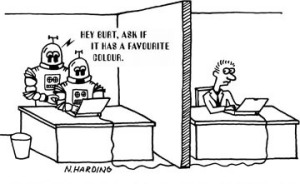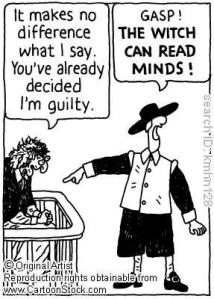“A very popular error – having the courage of one’s convictions; rather, it is a matter of having the courage for an attack upon one’s convictions” – Friedrich Nietzsche, 1844-1900
The following textbites are excerpts from Richard von Lagemaat’s course book “Theory of Knowledge” (we follow him on Twitter @TOKtweet):
The most obvious thing that distinguishes knowledge from belief is truth. If you know something, then what you claim to know must be true, but if you merely believe it, then it may be true or it may be false. This is why you cannot know that Rome is the capital of Italy, or that pigs have wings, or that the earth is flat.
…truth is independent of of what anyone happens to believe is true, and that simply believing something is true does not make it true. Indeed, even if everyone believes that something is true, it may turn out to be false…knowledge requires something less than certainty. In practice, when we say something is “true” we usually mean that it is “beyond a reasonable doubt”.
When you know something then what you claim to know must not only be true but you must believe it to be true…while truth is an objective requirement for knowledge, then belief is a subjective requirement for it.
***If you have no conscious awareness of something, then it makes little sense to say you know it (i.e. books can’t know facts, calculators can’t know 2+2=4)
As technology develops, do you think it will ever make sense to say a computer knows things?
***note: there will be a separate blog post/activities on A.I.
Our beliefs must be justified and in the right sort of way. We usually justify beliefs and knowledge claims by appealing to one of the four ways of knowing:
– “I saw it!” (perception)
–“Someone told me” (language)
– “I worked it out” (reason)
– “It’s intuitively obvious” (emotion)
(But…) Why are some ways of justification (such as perception), usually considered acceptable, while others (like ESP) are not? It’s all about reliability…
Here are some interesting videos regarding the reliability of PERCEPTION:
1. How Your Memories Can be Twisted Under Social Pressure
2. Can You Trust Your Memory? Take These 2 Simple Tests
Of course, nothing is infallible and you can be sceptical about everything, but life is just too short, you have to make a judgement when a doubt is appropriate or not.
http://www.ted.com/talks/scott_fraser_the_problem_with_eyewitness_testimony.html
EVIDENCE
So, you have a reasonable belief with evidence, now what? Again, from Richard von Lagemaat:
Imagine someone claiming that there are little green men on Mars. When you challenge them to support their belief they say, “Well you can’t prove that there aren’t”.***The fact that you can’t prove that something ISN’T true does nothing to show that it IS true. This fallacy of thinking is called
ARGUMENT AD IGNORANTIUM
Thought Experiment:
1. Which of the following is an example of argument ad ignorantium?
a. Since many people claim to have seen ghosts, it is likely they exist
b. Many members of the Society for the Paranormal believe in ghosts
c. Ghosts must exist because no one has proved they do not.
d. It is true for me that ghosts exist.
2. With a partner, make up 2 examples of argument ad ignorantium and share with the class.
CONFIRMATION BIAS
Psychologists claim that humans have a tendency known as “confirmation bias”, to notice only evidence that supports our beliefs. (e.g. you believe in astrology so tend to notice only when your horoscope proves right and overlook the time it is wrong). ***It is important to look not only for evidence in favor of our beliefs, but also for evidence that would count against them (aka COUNTER-CLAIMS). This interesting blog post discusses how it works- and how it relates to old movies, political pundits, and Amazon wish lists.
For fun try this activity demonstrating c.b.
COHERENCE
Does your belief fit in or “cohere” with our current understanding of the world? Lagemaat asserts that although we should be open to new ideas, we would simply come undone if we cast doubt on all our beliefs at once. ***The more unlikely something is, relative to the current state of knowledge, the stronger the evidence in its favor should be before we can take it seriously. Carl Sagan said, “Extraordinary claims require extraordinary evidence“ – can you think of an example in History when this held true?
What sorts of extraordinary claims do you personally grapple with and think are less likely to be true?
SO WHAT?
Does it really matter WHAT we believe? If people have crazy ideas, should we just let them- I mean, what’s the harm, right? Lagemaat reminds us that beliefs DO matter, and some are more worthy of respect than others. Beliefs DEFINE who you are as a person. You will end up leading a life that is genuinely not your own unless you periodically examine your beliefs (“An unexamined life is not worth living”- Socrates)
Moreover, beliefs affect one’s ACTIONS, and can literally be a life and death deciding factor. Burning witches? Nazism? Terrorists? Death-wish cults? Voltaire pointed out that “People who believe absurdities will commit atrocities”.
HOW CULTS REWIRE YOUR BRAIN
IS THERE A REAL YOU? WHAT MAKES YOU YOU?
1. Do you think we should respect the beliefs of a racist or sexist person? Provide reasons. If possible, find a recent article or video that could be used to question this (for example, the July 2011 massacre by Norwegian “racist” Anders Breivik).
2. Find some examples of beliefs (modern or throughout History) that you think are both misguided and dangerous.


